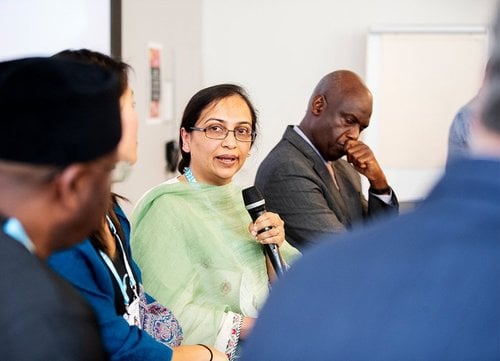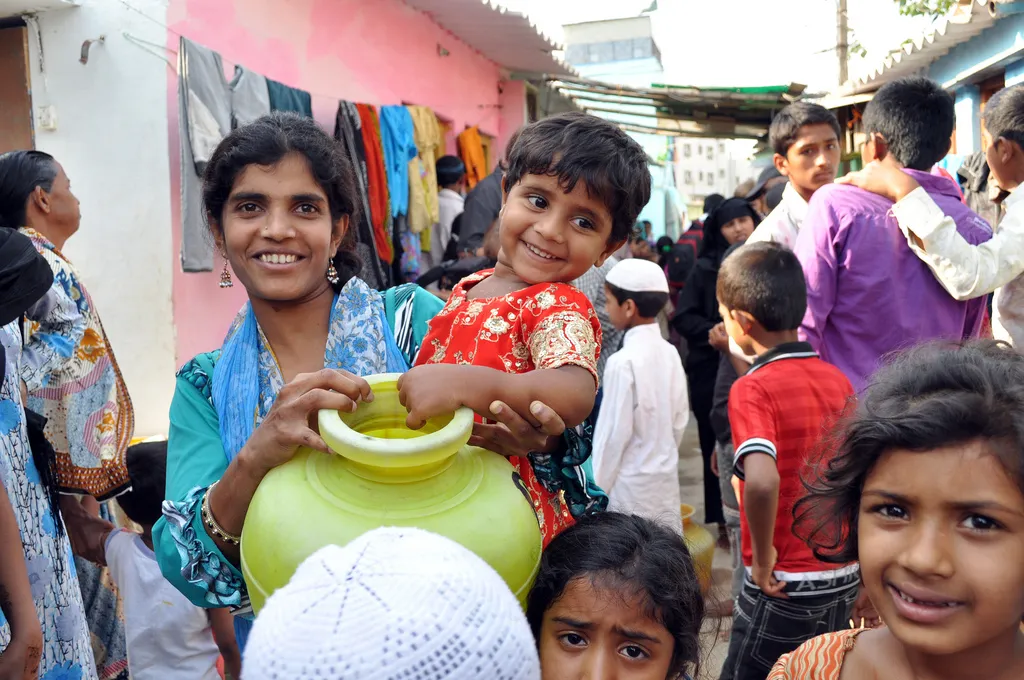Financial inclusion for safe water and sanitation helps women and their families break the cycle of poverty
Written by Vedika Bhandarkar, Water.org's President and Chief Operating Officer
Published February 4th, 2020
I started working at Water.org because I care about women and girls. Wondering why I would choose a water and sanitation organization if my first priority was helping women? When I worked in the corporate world, my personal giving was always focused on improving the lives of women and girls. In donating to programs focused on their empowerment, I quickly recognized that the effects of the global water crisis kept many women and their daughters trapped in a cycle of poverty. Water.org makes access to safe water and sanitation possible for women, girls, and families in need by making small, affordable loans available to them.
It’s expensive to live without access to safe water and sanitation.
For many people living in poverty, it’s expensive to not have access to water or a toilet. The reality is, in many countries around the world people in poverty pay a very high price for these things. They pay for water from a truck that delivers it to their slums and villages every day, or they pay healthcare expenses that arise from water-borne illnesses because they don’t have safe water to drink or a place to go. There are also coping costs–time spent collecting water, missed school, and time not earning an income. These coping costs are borne almost entirely by women and girls. They spend hours a day collecting water–hours they are unable to look after their families or attend school or engage in a job which could improve their family’s future. Some girls drop out of school to help their mothers collect water.
These costs make it harder for families to get out of poverty. Imagine spending 15-20% of your income to get water. You would have less money to pay for your other needs like food, clothing, shelter, and education. It’s simply not sustainable, yet this is the reality millions of families in need live each day. They are trapped in a cycle of poverty, trying to provide for their most basic needs.
Financial inclusion breaks the cycle of poverty. Let me explain.
My background in finance helped me understand that one of the major barriers that stands between people and access to safe water and sanitation is access to affordable financing, or the funds to pay for a tap or a toilet all at once. Too often, society incorrectly assumes people in poverty don’t know what solutions they need to climb out of poverty. But, many know exactly what they need and they lack the necessary funds to get those resources. This is why we do what we do at Water.org.
Financial inclusion means that individuals and businesses have access to useful and affordable financial products and services that meet their needs delivered in a responsible and sustained way.
We work with banks and other lending institutions who enable people living on less than $6 a day to get access to small loans for water connections and toilets. Together with our lending partners we empower families living in poverty with the opportunity to finance water taps and toilets. We do this by making upfront capital at affordable terms an option for them. Financial inclusion for this demographic means families in need get access to the money they need to construct a toilet, a water tap, or in some cases, they may work with their local government to get a water or sewage pipe connection to their home.
In more than 12 countries we have found that when given an opportunity to pay for water and sanitation improvements with small loans, families will finance long-term solutions versus struggle day-to-day to find that next liter of water or a place to go. Financing allows them to direct the money they are already spending toward a long-term solution. This means they can make their payments and save money long-term. And, they repay these small loans at a rate of 99%.
Access to water means more time, and often more income.
Financial inclusion for water and sanitation is changing lives. It makes water and sanitation accessible to those who need it most—specifically women—because for women, the water crisis is personal. They are responsible for finding a resource their families need to survive. When women and girls don’t have to spend hours a day collecting water, they immediately have more time. We’ve found that women spend about 1/3 of their newly earned time on an economic pursuit. If they used to spend six hours a day collecting water, and now they don’t, they will use two hours to earn income, which leads to financial stability and helps them get out of poverty.
Access to safe water and sanitation also prevents economic shocks to the family budget because the family is no longer sick from unsafe water, thus they spend less on medicine and doctor fees. Access to safe water and sanitation empowers families to save money and improve their economic position.
Access to affordable financing for safe water and sanitation means bright futures.
For all these reasons and more, access to safe water and sanitation is a lever to help women, their daughters, and their families get out of poverty.
“Working in India, I see firsthand the burden and limitations the water crisis inflicts on women and girls, and I’ve seen the profound impact that access to water and sanitation has in changing their lives, creating opportunity for work, education and bright futures."
Water.org has worked in India for 15 years and we’ve reached more than 11 million people here through financial inclusion. We’ve empowered millions of women and girls through small, affordable loans to get access to safe water and toilets at home. This means they now have greater agency in their lives – the time, money and health they need to create a bright future for themselves and their families. I’m honored to partner with these families through my work at Water.org.

Vedika Bhandarkar oversees all impact efforts within Water.org and leads the team responsible for working with financial institutions, global investors, and other sector leaders to empower millions of people in need with access to safe water and sanitation. She previously served as Water.org’s Managing Director, India.
Vedika has more than 25 years of experience building teams and businesses with Indian and international financial institutions. Prior to joining Water.org in January 2016, she served as Vice Chairman and Managing Director at Credit Suisse Securities (India) Private Limited from 2010-2015. Previously, she served as the Managing Director & Head of Investment Banking at J.P. Morgan.
Vedika serves as an Independent Director on the boards of several companies. She has been appointed as a part-time member of the Banks Board Bureau, and she also serves as a board member of the Jai Vakeel Foundation, an institution focused on children and adults with intellectual disabilities.
